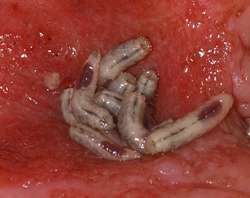Image: National Institutes of Health
(Medical Xpress) -- At the recent Interscience Conference on Anti-Microbial Agents and Chemotherapy, Dr. Lawrence Eron from the University of Hawaii presented his results on the use of maggots to heal diabetic wounds. The small trial treated 37 diabetic patients with 27 showing successful outcomes.
Conventional treatment for healing diabetic wounds is debridement, or the removal of infected and dead tissue with enzymes or scalpels, but these treatments are not always successful and often result in the need for amputation. Eron believes that maggot debridement may be the answer.
Eron and his team treated 37 patients, all with a type of artery disease that contributed to poor circulation and stubborn wound healing. Some of the patients had wounds up to five years old. The team placed 50 to 100 maggots on the wound and sealed them with a mesh-like material similar to pantyhose where they remained for 1-2 days. The maggots were then removed and replaced by fresh maggots for another cycle. This was repeated for five cycles.
Maggots feed on only dead tissue and leave the living tissue only. They produce a chemical which liquefies the dead tissue so they can suck it up. The maggots secrete chemicals that then stimulate the growth of granulation tissue necessary for the wounds to heal.
In terms of this study, success was defined by Eron to include a complete removal of dead tissue, the development of granulation tissue and a 50 percent closure of the wound. Out of those treated in the study, 21 patients showed success and more than a 75 percent closure of their wounds. Of the patients treated, five patient wounds were infected with MRSA and 10 were infected with B streptococci. All of these were successfully treated. Nine patients had wounds infected with MSSA, but only six of these had success with the treatment.
Patients in the study that did not show success had wounds with excessive inflammation, bleeding, severe peripheral vascular disease or infected bones.
This new treatment now needs to undergo clinical trials, but Eron is confident that it will pass and prove to be more successful and cheaper than conventional treatments.
© 2011 PhysOrg.com



















